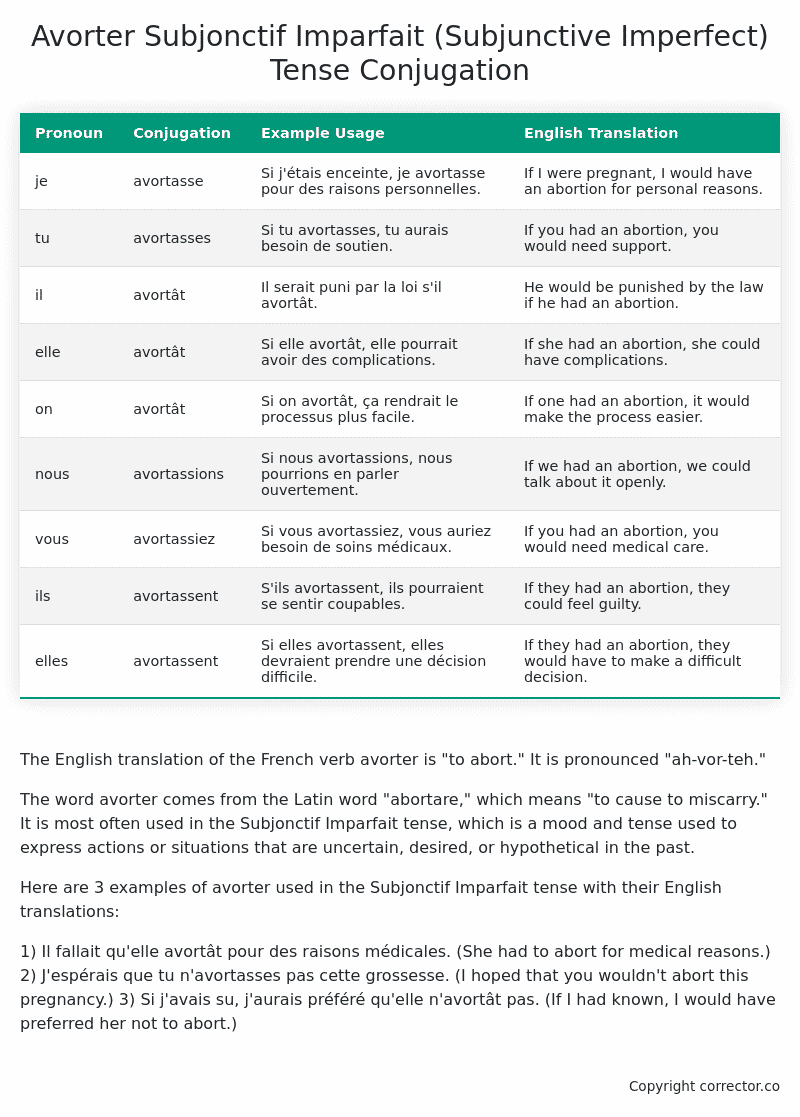Subjonctif Imparfait (Subjunctive Imperfect) Tense Conjugation of the French Verb avorter
Introduction to the verb avorter
The English translation of the French verb avorter is “to abort.” It is pronounced “ah-vor-teh.”
The word avorter comes from the Latin word “abortare,” which means “to cause to miscarry.” It is most often used in the Subjonctif Imparfait tense, which is a mood and tense used to express actions or situations that are uncertain, desired, or hypothetical in the past.
Here are 3 examples of avorter used in the Subjonctif Imparfait tense with their English translations:
1) Il fallait qu’elle avortât pour des raisons médicales. (She had to abort for medical reasons.)
2) J’espérais que tu n’avortasses pas cette grossesse. (I hoped that you wouldn’t abort this pregnancy.)
3) Si j’avais su, j’aurais préféré qu’elle n’avortât pas. (If I had known, I would have preferred her not to abort.)
Table of the Subjonctif Imparfait (Subjunctive Imperfect) Tense Conjugation of avorter
| Pronoun | Conjugation | Example Usage | English Translation |
|---|---|---|---|
| je | avortasse | Si j’étais enceinte, je avortasse pour des raisons personnelles. | If I were pregnant, I would have an abortion for personal reasons. |
| tu | avortasses | Si tu avortasses, tu aurais besoin de soutien. | If you had an abortion, you would need support. |
| il | avortât | Il serait puni par la loi s’il avortât. | He would be punished by the law if he had an abortion. |
| elle | avortât | Si elle avortât, elle pourrait avoir des complications. | If she had an abortion, she could have complications. |
| on | avortât | Si on avortât, ça rendrait le processus plus facile. | If one had an abortion, it would make the process easier. |
| nous | avortassions | Si nous avortassions, nous pourrions en parler ouvertement. | If we had an abortion, we could talk about it openly. |
| vous | avortassiez | Si vous avortassiez, vous auriez besoin de soins médicaux. | If you had an abortion, you would need medical care. |
| ils | avortassent | S’ils avortassent, ils pourraient se sentir coupables. | If they had an abortion, they could feel guilty. |
| elles | avortassent | Si elles avortassent, elles devraient prendre une décision difficile. | If they had an abortion, they would have to make a difficult decision. |
Other Conjugations for Avorter.
Le Present (Present Tense) Conjugation of the French Verb avorter
Imparfait (Imperfect) Tense Conjugation of the French Verb avorter
Passé Simple (Simple Past) Tense Conjugation of the French Verb avorter
Passé Composé (Present Perfect) Tense Conjugation of the French Verb avorter
Futur Simple (Simple Future) Tense Conjugation of the French Verb avorter
Futur Proche (Near Future) Tense Conjugation of the French Verb avorter
Plus-que-parfait (Pluperfect) Tense Conjugation of the French Verb avorter
Passé Antérieur (Past Anterior) Tense Conjugation of the French Verb avorter
Futur Antérieur (Future Anterior) Tense Conjugation of the French Verb avorter
Subjonctif Présent (Subjunctive Present) Tense Conjugation of the French Verb avorter
Subjonctif Passé (Subjunctive Past) Tense Conjugation of the French Verb avorter
Subjonctif Imparfait (Subjunctive Imperfect) Tense Conjugation of the French Verb avorter (this article)
Subjonctif Plus-que-parfait (Subjunctive Pluperfect) Tense Conjugation of the French Verb avorter
Conditionnel Présent (Conditional Present) Tense Conjugation of the French Verb avorter
Conditionnel Passé (Conditional Past) Tense Conjugation of the French Verb avorter
L’impératif Présent (Imperative Present) Tense Conjugation of the French Verb avorter
L’infinitif Présent (Infinitive Present) Tense Conjugation of the French Verb avorter
Struggling with French verbs or the language in general? Why not use our free French Grammar Checker – no registration required!
Get a FREE Download Study Sheet of this Conjugation 🔥
Simply right click the image below, click “save image” and get your free reference for the avorter Subjonctif Imparfait tense conjugation!

Avorter – About the French Subjonctif Imparfait (Subjunctive Imperfect) Tense
Formation
Common Everyday Usage Patterns
Interactions with Other Tenses
Subjonctif Présent
Indicatif Passé Composé
Conditional
Conditional Perfect
Summary
I hope you enjoyed this article on the verb avorter. Still in a learning mood? Check out another TOTALLY random French verb conjugation!


